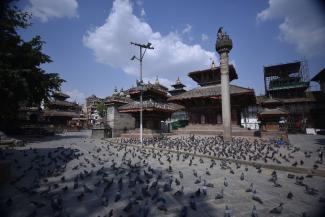Hard-hit country
Resilience tested once again
 Narayan Maharjan/picture-alliance/NurPhoto
Lots of pigeons, no tourists: Kathmandu’s Basantapur Durbar Square, a UNESCO world heritage site in mid-May.
Narayan Maharjan/picture-alliance/NurPhoto
Lots of pigeons, no tourists: Kathmandu’s Basantapur Durbar Square, a UNESCO world heritage site in mid-May.
Masses of informal daily labourers have lost their jobs. Their families now have little to eat. It is estimated that about 60 % of the jobs have disappeared. The tourism sector has collapsed. It had accounted for eight percent of gross domestic product (GDP) in 2018 and supported more than 1 million jobs. Hopes of recovery are distant.
Nepalis are resilient people. In past decades, they had to cope with a Maoist insurgency, the long-lasting debate of a new constitution and the devastating earthquake of 2015. There have been encouraging developments too: a progressive new constitution is now in place, and elections were held at municipal, state and federal levels. Government capacities are limited however, and the Covid-19 challenge is huge. Families and communities are tightly knit, but the situation is becoming increasingly desperate.
At first, it looked like Nepal could get away with just a few isolated Covid-19 cases, but lately infection numbers have begun to rise. There still are only a few hundred, most of which can be traced to labour migrants returning from India. In response, the government has kept prolonging the lockdown from week to week.
Unfortunately, the initial isolation strategy did not stop the virus from spreading. Closure of the Indian border made the situation worse. The country depends on imports from India, ranging from petrol to lentils. India is struggling with Covid-19 too, of course, and has stopped rice exports. Food prices have risen considerably in Nepal. In view of the hardship people suffer, the big question is how long the blunt lockdown can be sustained.
There are huge practical challenges – from the lack of personal protective equipment for medical staff to rotting vegetables in the fields. However, the biggest challenge still lies ahead: up to 4 million Nepalese work abroad – mostly in India, Malaysia and the Gulf countries. Their remittances contribute about a third to Nepal’s GDP. In April, however, remittances fell by more than 50 %.
It adds to the problems that the migrants typically live in very harsh conditions and are thus exposed to the novel coronavirus. More than 12,000 Covid-19 infections of non-resident Nepalese citizens have been confirmed abroad. Tens of thousands have lost their jobs and desperately want to return home. However, the country cannot run a repatriation operation of that scale. The economy was already struggling to create enough employment before the pandemic, and returning migrants will cause additional stress in the labour market. The outlook for investment, trade and domestic consumption is bleak.
Though Nepal does not have large infection numbers so far, the country is hard hit. It may need a completely new development strategy. Currently, policy debate in Nepal is focused on a renewed role for agriculture. Investments in this sector might indeed be a good start, boosting food security and reducing the dependence on imports. On the other hand, farming alone cannot create the opportunities needed to satisfy a population of 30 million mostly young and aspiring people. The government will need to come up with fresh ideas. Nepalis will need all the support they can get. The decision of Germany’s Federal Government to terminate its bilateral cooperation with Nepal in context of a new global development strategy therefore comes at a bad time. To many Nepalis it feels like a friend is turning away in a time of need.
Jonathan Menge heads the office of the Friedrich-Ebert-Stiftung in Nepal.
fes@fesnepal.org

